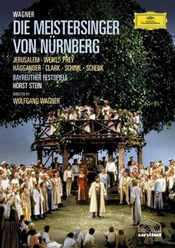As a televised production, the
overture lacks the usual audience shots or pans over the orchestra. Instead, the period line
drawings of Nűrnberg, along with maps of the city, offer a departure that also maintains the
visual interest. Unlike some other operas released by Deutsche Grammophon, this performance
was made for television and, as such, represents a studio recording rather than the kind of live
stage performance broadcast on "Live from the Met" or other, similar means. As such, the visual
aspect of the performance is quite effective, with lighting and angles responsive to the studio
used for the recording. That stated, the ambiance is not as full as can occur in a conventional
opera house, where a level of resonance adds to the overall effect.
That aside, the staging is by Wolfgang Wagner, who also directed the production, which included
an essentially all-star cast. The principals are, for the most part familiar names and voices, and
there is no question about the talented musicians involved with this particular Meistersinger.
Since this performance was recorded over two decades ago, some of the then-new singers have
become familiar to many audiences, and the choices seem well-thought. One anomaly, though,
occurs with the character of Hans Sachs. It is customary to encounter relatively young performers
cast in the roles of David and Walther, but the choice of then-young Bernd Weikl as Hans Sachs
contributed a new and effective dynamic to this recording.
Much can be said, though, for the attention to detail that emerges in a filmed production like this
one. Conducted by the durable Horst Stein, it is a solid performance that delivers the score
without any surprising or idiosyncratic interpretations. At the core of this production is Hans
Sachs, whose humanity precipitates the resolution of the drama, and Weikl has created
memorable interpretation. His rich, supple tone is consistently present, as he anchors the fine cast
from the opening through the end. He clearly knows the role, both vocally and dramatically, with
gestures and body language that are fully in character — his Sachs is worth knowing, and Weikl's
performance stands well with that of other fine singers who have made him come alive on stage.
Yet it is hard to appreciate the character of Sachs without a believable Beckmesser, and Hermann
Prey rendered the thorny personage well. It seems all too easy to portray Beckmesser as a
caricature, but that kind of depiction falls short of the needs of this libretto. Prey brings out the
earnestness of Beckmesser from the start, with a fine delivery of the role.
With the rest of the cast, the performances are reliable, but undifferentiated. It seems that in the
conception of this production, the various characters and their music merge into a more unified
ensemble, just as the various themes coalesce in the overture and other instrumental portions of
the opera. This approach is not without its interest, as it calls attention to the various musical
elements of the work. Yet the concept of music drama that Wagner had delineated by the time he
composed Die Meistersinger requires a balance between the dramatic elements with musical
finesse, and some overt theatricality has its place in performances of this opera. With several
other fine DVDs of Die Meistersinger von Nűrnberg currently available, it is difficult not to draw
comparisons with other performances. The dynamic tension of the other Deutsche Grammophon
DVD, the more recent one from the Met, stands in contrast to this more stagey one from
Bayreuth, and a comparison of the two points to the differences that can occur when an audience
is part of the recording. It is, perhaps, the lack of the live stage that affects the sense of drama
that is critical to opera, and if the present Bayreuth DVD is lacking, the absence of such dramatic
tension must be noted.
While the sound is a bit dry, it is nonetheless clear, without balance problems. As a DVD, rather
than a CD, a choice of sound exists, to PCM Stereo or DTS sound, as is the case with other
releases from Deutsche Grammophon. This particular DVD appears to be marketed to the
English-speaking world, since information about the production, like rubrics for stage direction,
costumes, etc., as well as the digital navigation, are in English. The booklet includes full track
listings, plus a synopsis of the libretto for each of the tracks. All in all, this is a fine performance
that preserves performances of excellent Wagnerians, and it is for their work that this recording
has much to recommend.
James L. Zychowicz
